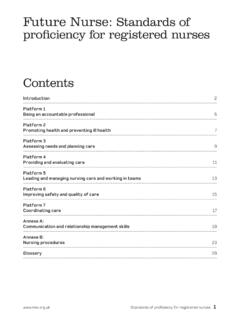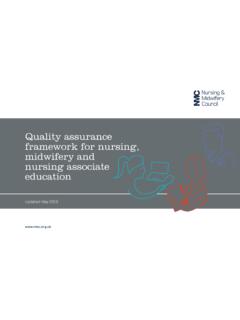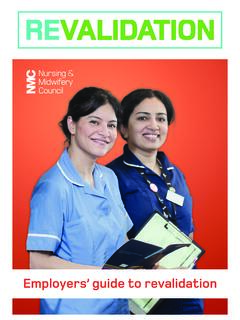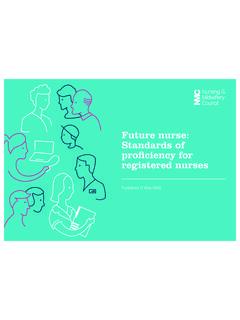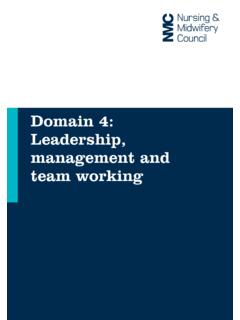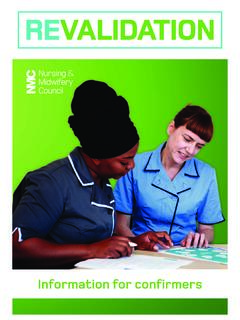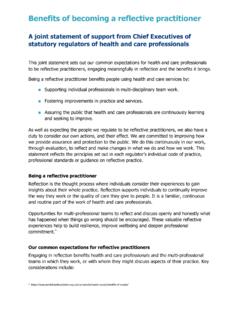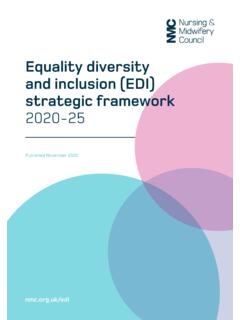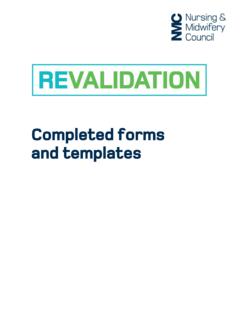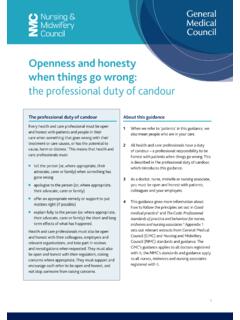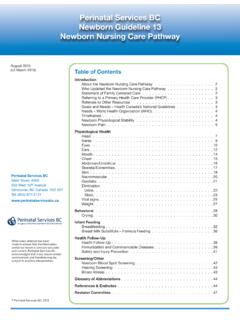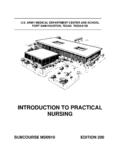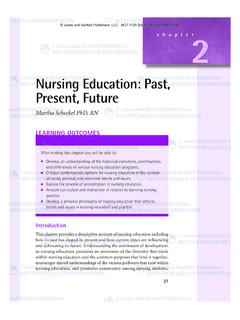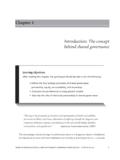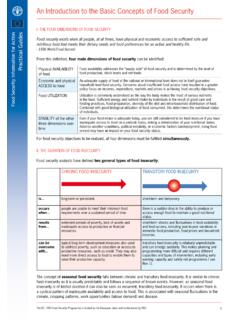Transcription of Standards of proficiency for nursing associates
1 Standards of proficiency for nursing associates Published 10 October 2018. Standards of proficiency for nursing associates 1. Contents Introduction 2. Platform 1. Being an accountable professional 4. Platform 2. Promoting health and preventing ill health 7. Platform 3. Provide and monitor care 9. Platform 4. Working in teams 12. Platform 5. Improving safety and quality of care 14. Platform 6. Contributing to integrated care 16. Annexe A: Communication and relationship management skills 18. Annexe B: Procedures to be undertaken by the nursing associate 22. Glossary 27. Standards of proficiency for nursing associates 1.
2 Introduction The proficiencies serve a number of purposes: They set out for patients and the public what nursing associates know and can do when they join the NMC register. The Standards of proficiency presented here represent the Standards of knowledge and skills that a nursing The Standards help nursing associates by providing clarity about associate will need to meet in order to be considered their role. Read alongside the nursing Standards of proficiency , they demonstrate the synergies and differences between the by the NMC as capable of safe and effective nursing two roles.
3 Associate practice. These Standards have been designed to apply across all health and care settings. For nurses and other health and care professionals, the Standards provide clarity on the knowledge and skills they can reasonably expect all nursing associates to have and this will help inform safe decisions about delegation. Employers understand what nursing associates can contribute to the health and wellbeing of patients and service users, and can make effective decisions about whether and how to use the role. Educators must develop and deliver programmes that equip nursing associates with the skills, knowledge and behaviours needed to meet these Standards of proficiency when they qualify.
4 nursing associate is a new role being introduced into the health and care workforce in England from 20191 . It is a generic role (not defined by a field of nursing ) but within the discipline of nursing . nursing associates are intended to bridge a gap between health and care assistants, and registered nurses. While the nursing associate role is new, it is particularly important that the public, health and care professionals, and employers can develop an understanding of what nursing associates know and can do. 1. The nursing associate role is being introduced and regulated in England from 2019.
5 If other countries of the UK decide to use and regulate the role in future it will require a change to our legislation, and the updating of our Standards Standards of proficiency for nursing associates 2. nursing associates are members of the nursing team, who We have designed these proficiencies to align with the latest have gained a Foundation Degree, typically involving two years Standards of proficiency for nurses: of higher education. They are not nurses; nursing is a graduate entry profession and those joining the nursing part of the NMC To allow people to understand the differences between the register require a degree.
6 Nurses also develop additional skills and two roles knowledge within a specific field of nursing . To enable education providers to facilitate educational nursing associates are a new profession, accountable for their progression from nursing associate to nurse practice. These proficiencies set out what pre-registration training will equip nursing associates to know, and do. Once they are To demonstrate how the nursing associate role can support the practising, nursing associates can undertake further education and registered nurse, to allow registered nurses to deliver the NMC's training and demonstrate additional knowledge and skills, enhancing enhanced Future Nurse' Standards of proficiency .
7 Their competence as other registered professionals routinely do. The roles played by nursing associates will vary from setting to The outcome statements for each platform have been designed setting, depending on local clinical frameworks, and it may also be to apply across all health and care settings. At the point of shaped by national guidance. registration, nursing associates are required to meet all outcome statements and to demonstrate an awareness of how nursing associates provide care for people of all ages and from requirements vary across different health and care settings.
8 As different backgrounds, cultures and beliefs. They provide care for the nursing associate role is generic, students may demonstrate people who have mental, physical, cognitive and behavioural care proficiencies in any appropriate context, and there is no needs, those living with dementia, the elderly and for people at the expectation that they must be demonstrated in every health and end of their life. They must be able to care for people in their own care setting. home, in the community or hospital or in any health care settings where their needs are supported and managed.
9 They work in the In common with all of our regulatory Standards and guidance, these context of continual change, challenging environments, different proficiencies will be subject to periodic review. The current version models of care delivery, shifting demographics, innovation and of our proficiencies can always be found on our website. rapidly evolving technologies. Increasing integration of health and social care services will require nursing associates to play a proactive role in multidisciplinary teams. Standards of proficiency for nursing associates 3. Annexe A: Being an Promoting Provide and Working Improving safety Contributing to Communication Annexe B: accountable health and preventing Glossary monitor care in teams and quality of care integrated care and relationship Procedures professional ill health management skills Platform 1.
10 Being an accountable professional nursing associates act in the best interests of people, putting them first and providing nursing care that is person-centred, safe and compassionate. They act professionally at all times and use their knowledge and experience to make evidence based decisions and solve problems. They recognise and work within the limits of their competence and are responsible for their actions. Standards of proficiency for nursing associates 4. Annexe A: Being an Promoting Provide and Working Improving safety Contributing to Communication Annexe B: accountable health and preventing Glossary monitor care in teams and quality of care integrated care and relationship Procedures professional ill health management skills 1.
